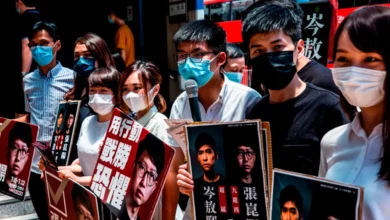Despite being widely touted as a potential presidential candidate, Mohamed ElBaradei is determined not to enter the competition unless significant constitutional change takes place first. Advocates for change, however, are divided on the issue.
While some of the supporters of the Nobel-prize winner and former head of the IAEA feel he should take on the challenge and run for the elections, members of his inner circle feel it’s wise for him to maintain his distance.
Amr el-Shobaki, a political analyst from Al-Ahram Center for Political and Strategic Studies explains, “They want to push ElBaradei into the political arena, and for him to stand in the elections […] but he’s made it clear that he will not be running unless there is realistic chance of winning.”
Others believe ElBaradei needs to stop vacilating and make a firm declaration. Samer Soliman, a leftist activist and professor in the Political Science Department at the American University in Cairo, is one such person. According to Soliman, “instead of saying, ‘I want to change the rules of the game if I’m going to run in the elections,’ he should say, ‘I am going to run in the elections, help me to change the rules of the game.'”
ElBaradei is generally charged with being vague. “Since he came, he hasn’t showed his stance on social and economic issues. We don’t know how he looks at Israel, Camp David or the United States. We don’t know how he thinks about liberal economy, ” says Mohamed Waked, a socialist activist. “Not declaring his ideologies means he’s hiding them. This is scary,” he adds.
Playing by the rules
According to Egyptian law on presidential elections, amended in 2005, candidates must be the member of the board of a registered party for at least a year prior to announcing an intention to run for the presidency. Alternatively, to stand as an independent, the candidate must receive 250 votes from members of Egypt’s elected bodies. The National Democratic Party’s (NDP) domination of parliament makes it impossible for ElBaradei to play by these rules.
For these reasons, ElBaradei has opted to campaign for reform in an electoral system that is believed to favor NDP candidates, and has refused to stand in the elections unless there are guarantees in place that they will be fair.
“This makes sense, because no one with the authority and influence of ElBaradei should be seen as a puppet in the hands of the ruling party, like other opposition figures,” says Zyad el-Eleimy, lawyer and member of the National Campaign to Support ElBaradei.
Shobaki agrees. “In the past 30 years others, such as the Wafd Party, [leader of the Ghad Party] Ayman Nour and [leader of the Karama Party] Hamdeen Sabbahi, have tried to make changes while adhering to the rules of the game, with little success. So, ElBaradei is simply trying to change the rules,” says Shobaki. Nour secured 7.3 percent of the votes in the 2005 presidential elections, while Noaman Gomaa gained 2.8 percent.
ElBaradei’s campaign for change
As part of his push for reform, ElBaradei has asked people to sign up to his “seven changes.” This statement includes demands for an end to emergency law, a guarantee of free elections, the right for Egyptian expatriates to vote, and amendments to the parts of the Consitution which put obstacles in the way the candicacy of independent nominees.
Eleimy confirms that so far over 100,000 Egyptians have signed the statement demanding reform: “We’re attempting to work with everyone calling for change, whether individuals or parties.”
As part of his effort to reach out to all parties in his campain, ElBaradei’s recent meeting with Saad el-Katatny, MP and head of the Muslim Brotherhood block in parliament, has sparked some controversy. This week, the Brotherhood launched a campaign on their website to collect electronic signatures supporting the seven demands for reform.
In a recent interview, ElBaradei said the meeting was not in any way an indication of similarities in ideology, but rather a political visit to the head of an influential opposition group.
Long-term process for change
Shobaki, who is close to the inner circles of ElBaradei’s advisors, says ElBaradei’s tone in the coming days is likely to be more conciliatory and less radical in order to gain the support of people in the regime itself. “ElBaradei will have a greater chance if he has people within the regime backing him. This, in my opinion, is more likely to happen in a post-Mubarak era.”
During the interview, ElBaradei said that he had been contacted by NDP members who in confidence expressed support for his aims.
George Ishak, a founding member of the Kefaya movement (a loose coalition of opposition parties) has acknowledged that the process will take time. “It will take five or six years to make a visible impact.”
Why ElBaradei?
Many see ElBaradei as the ideal figurehead for the democratic current that is rising in Egypt.
“It’s not ElBaradei himself, but the impact he has on bringing people together–the idea was already smouldering, but ElBaradei was the match that lit the fire,” says Soliman, also a member of the Leftists for ElBaradei group.
Analysts agree that the current political climate in Egypt shows a country ripe for change. In the past few months, thousands have hit the streets in protests over issues related to the current regime’s handling of social, economic and political issues.
ElBaradei is perceived by many as likely to succeed, both because he is untainted by corruption and also because he is a figure of international standing.
“I believe that ElBaradei has a real chance in the presidential elections. In 2005 there was no real alternative, but now there is,” said Ishak, pointing to the fact that in the Sharek online interactive forum, launched by the oppositon to measure the popularity of potential candidates, ElBaradei tops a list of forty.




